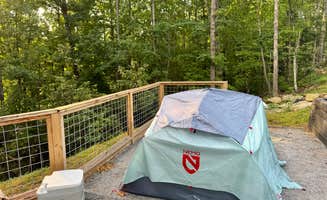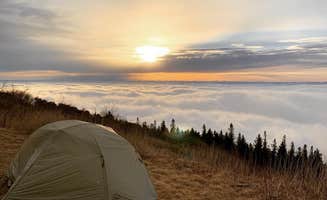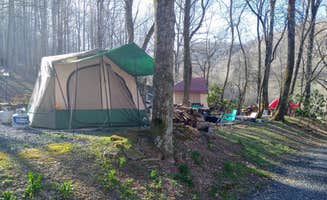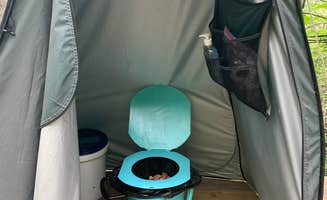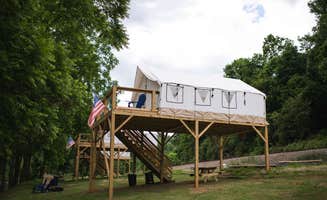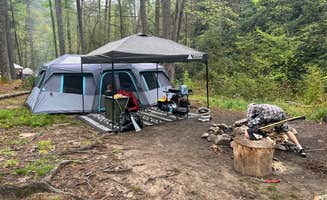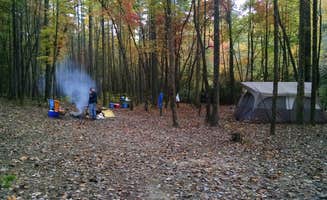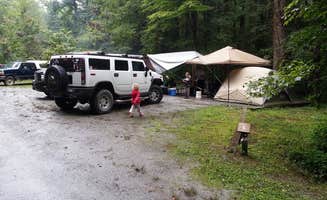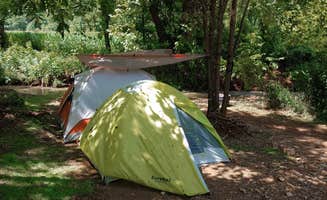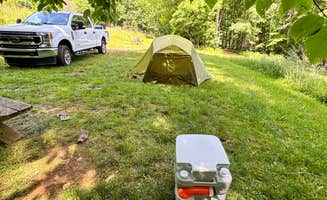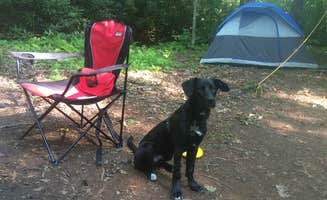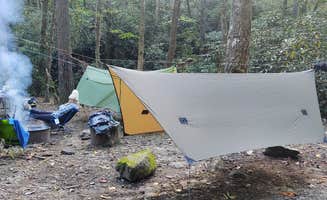Tent campsites near Little Switzerland, North Carolina scatter across elevations ranging from 1,200 to over 3,500 feet in the Pisgah National Forest region. Summer temperatures in these campgrounds typically average 15-20°F cooler than surrounding lowland areas, with overnight temperatures sometimes dropping into the 40s even in July. Many sites require driving on unpaved forest service roads that can be challenging after rainfall.
What to do
Waterfall exploration: The Mortimer Campground area serves as an excellent base for accessing nearby waterfalls. "There are trails and even a waterfall within half a mile from camp," notes Karen B. from Mortimer Campground. Another camper mentioned, "A 1/2 mile round trip hike to a waterfall on the property!"
Mountain hiking: For serious hikers, Maple Camp Bald provides access to challenging trails. "It's a 6 mile hike up Maple Camp Ridge on trail 191 (Buncombe Horse Range) starting from a small parking lot close to Carolina Hemlocks Campground," shares Francis C. about Maple Camp Bald. The area offers exceptional sunrise viewing opportunities when weather permits.
Creek swimming: Wilson Creek area near Mortimer provides natural swimming spots. "There is a spot nearby where a lot of people like to float on tubes kind of like a lazy river type thing," explains Tony E. Many campsites in the region feature direct creek access, though water temperatures remain cold even in summer months.
What campers like
Natural privacy: The walk-in tent sites at Catawba River campground create secluded camping experiences. "The sites were all so unique and cozy in a little circle path that takes you down by the water. So many nice little places to hang a hammock and relax," shares Todd S. from Catawba River. This layout provides separation between campsites that drive-in locations often lack.
Group facilities: For larger gatherings, Briar Bottom Group Campground offers specialized amenities. "Each campsite has a huge covered shelter with a number of picnic tables underneath, which is super nice in the rain. Each site has a fire ring and two grills," reports Katy S. from Briar Bottom Group Campground. The campground features six group sites with nearby river access.
Clean facilities: Black Bear Campground, one of the newer facilities in the region, maintains exceptionally clean amenities. "The restrooms are in immaculate condition," notes Raul G. Another camper mentioned, "This is a brand new campground. Either they keep the sites extremely clean after each guest, or we were the first to stay at our site."
What you should know
Limited cell service: Most camping areas around Little Switzerland have no cellular connectivity. At Briar Bottom, "The campground doesn't have any cell reception! The closest place where you can connect to the internet is the golf course, or the general store on HW80," explains Katy S.
Weather preparedness: Mountain weather changes quickly, particularly at higher elevations. One camper at Steele Creek reported, "I did get eaten alive by mosquitos and I found a tick on my chair so be on the lookout." Pack insect repellent, rain gear, and warm layers even for summer camping.
Site availability challenges: Many dispersed camping areas fill quickly during peak season. "I got here late, around 5 pm on Saturday, so I had difficulty finding a spot," notes Brenna M. about Steele Creek. Arrive by early afternoon on weekdays for best site selection at non-reservation campgrounds.
Tips for camping with families
Wildlife awareness: Bear activity requires proper food storage. At Briar Bottom, one camper advised, "Make sure to lock up all your food the black bears will come take it if not." Bear-resistant containers or vehicle storage is essential for all food items and scented products.
Campground selection: For families with younger children, established campgrounds with facilities provide easier camping experiences. "Black Bear Campground is perfect for someone new to camping as the utilities are very clean and you don't feel extremely isolated," shares Brandon G. The campground offers dedicated tent pads and clean shower facilities.
Environmental stewardship: Teaching children to protect these natural areas ensures their preservation. One camper at Pisgah National Forest urged, "Please please please pick up after yourselves!!!!!! No trash left behind!!!" Bring trash bags and pack out everything you bring in.
Tips from RVers
Site dimensions: Most campgrounds in this region have limited space for larger RVs. "A small trailer would fit, nothing big. No W/E/S but great place," notes Cody B. about Mortimer Campground. Measure your unit before booking, as many sites cannot accommodate RVs longer than 20 feet.


